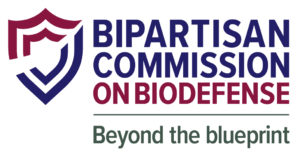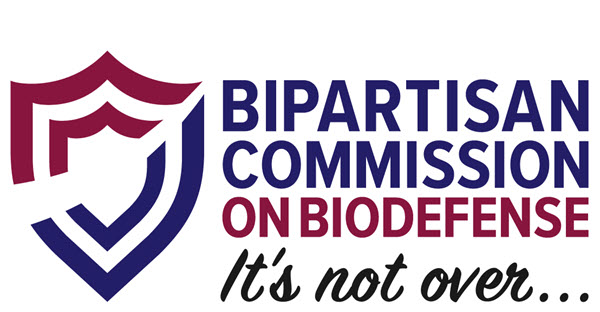Commission Commends White House for Pandemic Preparedness Plan

FOR IMMEDIATE RELEASE
Contact: Steve Aaron
SRA Communications
(717) 554-8614
steve@SRACommunications.com
COMMISSION COMMENDS WHITE HOUSE FOR PANDEMIC PREPAREDNESS PLAN; URGES HIGHER FUNDING LEVELS TO ENSURE SUCCESS
WASHINGTON, D.C. (Sept. 3, 2021) – The Bipartisan Commission on Biodefense today commended the Biden Administration for developing a new American Pandemic Preparedness Plan to invest boldly in a national effort that transforms U.S. capabilities to respond quickly and effectively to future biological threats. As detailed in the Commission’s January 2021 report, The Apollo Program for Biodefense – Winning the Race Against Biological Threats, doing so could effectively end the era of pandemic threats by 2030.
The Commission, however, does not believe the $65 billion proposed in the Biden plan is sufficient, and instead will continue to urge Congress to invest $10 billion a year for ten years. This amount continues to have an ever-increasing return on investment as the biological threat is likely to increase in frequency and severity. In comparison, the economic damage to the U.S. has been estimated at $16 trillion in lost economic output, direct spending, mortality and morbidity.
“The ability to effectively prevent pandemics and biological attacks rests on a sound foundation of science and technology. National and international partners in the government, academia, industry, and other areas of the private sector must engage to take biological threats off the table,” said Commission Co-Chair, former Senator Joe Lieberman. “We need innovation – the sort of innovation that helps us solve difficult problems posed by biological threats like COVID-19. The Commission is pleased to see the Administration recognizes it will take an effort as grand as the lunar Apollo Program of the 60’s to get this done.”
Sen. Lieberman noted that many of the technological innovations we need to secure the Nation from biological threats already exist, are in development, or have feasible pathways to come to fruition. “As one of the most innovative and well-resourced countries in the world,” he said, “we can embark on an Apollo Program for Biodefense to meet and eliminate all biological threats. The program needs to be practical and ought to address many of the concrete recommendations we made in our National Blueprint for Biodefense.”
“I’m glad to see this White House recognize what we do – that we can learn from our national experience with the lunar Apollo Program and apply it to other large-scale seemingly impossible problems, like fighting and eliminating biological threats,” said former Secretary of Homeland Security and Commission co-chair, Governor Tom Ridge. “Targeted, significant investments coupled with government accountability, public-private partnerships, ingenuity, and perseverance will get us there. I look forward to the day when the Apollo Program for Biodefense – through the American Pandemic Preparedness Plan – is, as they say, go for launch.”
The Commission urges Congress to allocate funding for efforts to develop and deploy the technologies needed to defend against all biological threats, empower public health, and prevent pandemics, no matter what the source. Examples of such investments include:
- Vaccine Candidates for Prototype Pathogens (e.g., one prototype pathogen in each of the 26 viral families known to infect humans).
- Multi-Pathogen Therapeutic Drugs in Advance of Outbreaks (those that can be effective against multiple viruses).
- Flexible and Scalable Manufacturing of Pharmaceuticals (i.e., easily expanded or increased)
- Needle-Free Methods of Drug and Vaccine Administration
- Ubiquitous Sequencing (i.e., reading of genetic material)
- Minimally- and Non-Invasive Infection Detection
- Massively Multiplexed Detection Capabilities (e.g., simultaneously testing for many pathogens at once).
- Point-of-Person Diagnostics (tests individuals can take wherever they are).
About the Bipartisan Commission on Biodefense
The Bipartisan Commission on Biodefense was established in 2014 to conduct a comprehensive assessment of the state of U.S. biodefense efforts, and to issue recommendations to foster change. The Commission’s 2015 report, A National Blueprint for Biodefense: Leadership and Major Reform Needed to Optimize Efforts, identified capability gaps and recommended changes to U.S. policy and law to strengthen national biodefense while optimizing resource investments. In its latest report, Biodefense in Crisis: Immediate Action Needed to Address National Vulnerabilities, the Commission provides new recommendations and describes the extent to which the federal government has implemented the Commission’s recommendations. Other Commission publications have addressed critical needs for agrodefense, biodefense budgeting, diagnostics, science and technology, and State, Local, Tribal and Territorial response capabilities. In September 2018, the White House released the National Biodefense Strategy, a top recommendation from the Blueprint. The Commission continues to address biodefense challenges and to urge reform. Former Senator Joe Lieberman and former Governor Tom Ridge co-chair the Commission. Hudson Institute is the Commission’s fiscal sponsor.

